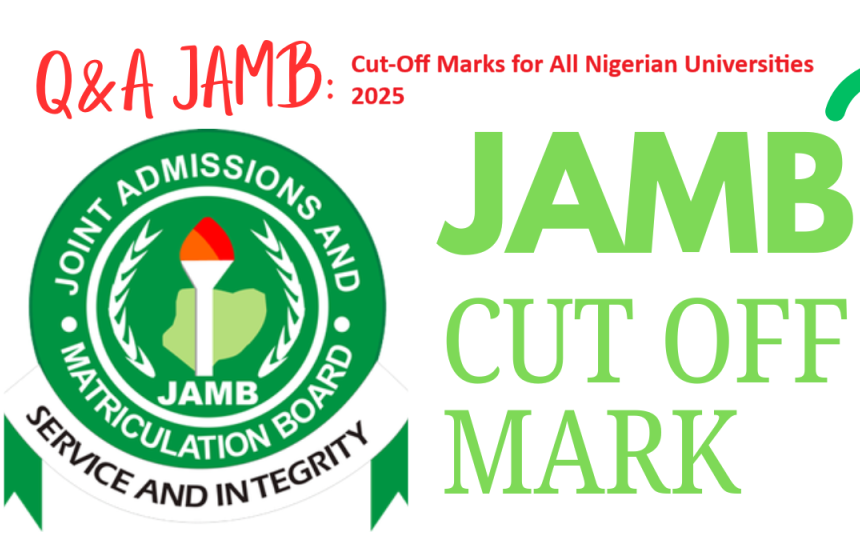University of Abuja Minimum Cut-Off Score – The University of Abuja (UNIABUJA) has officially published the cut-off marks for the 2025/2026 admission exercise. This news has been long awaited by thousands of candidates who sat for the Unified Tertiary Matriculation Examination (UTME) who are hoping to gain admission.
Understanding the cut-off marks is one of the first steps to planning your admission journey. Every year, the university sets a minimum score serves as a determinant for the Post-UTME screening and which candidates stand a better chance of being admitted into specific programs.
This guide will walk you through everything you need to know about the University of Abuja Minimum Cut-Off Score for 2025/2026, why they matter, and how they affect your chances of gaining admission.
University of Abuja Minimum Cut-Off Score – A Brief Look at University of Abuja
Located in Nigeria’s capital city, the University of Abuja was established in 1988 and officially opened its doors to students in 1990.
From its humble beginnings at the mini-campus in Gwagwalada, UNIABUJA has expanded into a full-fledged institution with faculties ranging from Arts and Social Sciences to Medicine, Engineering, Law, and Veterinary Medicine.
The school has a reputation for academic excellence and national influence, thanks to its strategic location in the Federal Capital Territory (FCT). Being in the heart of Nigeria gives the institution unique advantages, including access to policymakers, government agencies, and international organizations that frequently collaborate with the university.
The Role of University of Abuja Minimum Cut-Off Score in Admission
Cut-off marks are not just random numbers on a list. They serve as the first layer of screening in Nigeria’s competitive admission system. Think of them as the doorway and anyone who fails to meet the minimum requirement doesn’t even get a chance to step in for further evaluation.
At UNIABUJA, the admission process works in two stages:
- General UTME Requirement: Every applicant must score at least 180 in the UTME and select UNIABUJA as their first-choice institution.
- Departmental Cut-Off: After clearing the initial bar, the specific course you applied for determines your next hurdle. Some courses have higher cut-offs due to the intense competition for limited spaces.
In simple terms, while a score of 180 may get you into less competitive courses, fields like Law, Nursing, or Medicine will require much more, sometimes as high as 230.
University of Abuja Minimum Cut-Off Score for Different Courses
Here’s a breakdown of the approved University of Abuja Minimum Cut-Off Score for various faculties and programmes:
College of Health Sciences
The admission cut-off marks for different courses at the university vary across faculties, and it is important for aspiring students to take note of these requirements in order to make informed choices.
- Medicine and Surgery (MBBS): 230
Faculty of Agriculture
Moving on to the Faculty of Agriculture, the minimum cut-off mark for Agriculture is 180. This offers opportunities for students who are passionate about food production, farming innovations, and agricultural research to pursue a career in this vital field.
Faculty of Arts
The Faculty of Arts provides a wide range of programs with diverse cut-off requirements. Arabic Studies, English and Literary Studies, History, Linguistics, Philosophy, and Islamic Studies all require a minimum score of 180, making them fairly accessible to a wide range of candidates. Christian Religious Studies, on the other hand, has a slightly higher requirement of 200, reflecting its specialized nature.
Communication and Media Studies
In the field of Communication and Media Studies, all the programs have a general cut-off point of 180
- Advertising
- Broadcasting
- Film and Multimedia Studies
- Journalism and Media Studies
- Development Communication Studies
- Public Relations
- Strategic Communication
- Information and Media Studies
Faculty of Education
All Education-related courses, including Biology Education, English Education, Agricultural Education, Chemistry Education, Islamic Studies Education, and others, require a minimum of 180.
Faculty of Engineering
Engineering, one of the most technical faculties, demands a stronger academic performance. All programs within the Faculty of Engineering have a cut-off point of 200
- Aeronautical Engineering
- Civil Engineering
- Mechanical Engineering
- Electrical Engineering
- Chemical Engineering
- Agricultural Engineering
- Railway Engineering
Faculty of Environmental Sciences
For the Faculty of Environmental Sciences, the cut-off mark is set at 180 across the board.
- Architecture
- Estate Management
- Quantity Surveying
- Building Technology
- Urban & Regional Planning
- Surveying & Geoinformatics
- Industrial Design
Faculty of Law
The Faculty of Law is also highly competitive. Civil Law requires a very high cut-off of 230, aligning it with Medicine and Surgery as one of the most selective programs in the university. Islamic Law has a slightly lower cut-off at 200, but it still demands a strong performance from candidates who aspire to join the faculty.
Faculty of Management Sciences
In the Faculty of Management Sciences, the cut-off mark is set at 180 for all programs
- Accounting
- Business Administration
- Entrepreneurship
- Public Administration
- Tourism & Hospitality Management
Faculty of Nursing and Allied Health Sciences
- Nursing Science: 230
- Medical Laboratory Science (BMLS): 200
Faculty of Pharmaceutical Sciences
The Faculty of Pharmaceutical Sciences, offering the Doctor of Pharmacy (Pharm D) program, has its cut-off set at 200. Pharmacy, being a critical health-related course, demands precision and strong knowledge in science, hence the relatively high requirement.
Faculty of Sciences
- Biochemistry: 190
- Microbiology: 190
- Geology and Gemology: 190
- Physics: 180
- Mathematics: 180
- Biology: 180
- Chemistry: 180
- Statistics: 180
- Zoology: 180
- Computer Science: 180
Faculty of Social Sciences
The Faculty of Social Sciences maintains a uniform cut-off mark of 180 across all its programs. These include:
- Economics
- Political Science & International Relations
- Sociology
- Geography
- Library & Information Science
Faculty of Veterinary Medicine
- Veterinary Medicine (DVM): 200
Importance of These Cut-Off Points
At first glance, cut-off marks may appear to be just simple scores, but they actually represent competition and opportunity. Thousands of candidates choose UNIABUJA each year, but only a fraction gain admission.
For instance, Medicine might have only a few hundred slots available, but thousands of students apply for it. Naturally, the cut-off is raised to filter the best candidates. Another point to note is that cut-off marks don’t guarantee automatic admission.
They only qualify you for the next stage, Post-UTME screening and further departmental evaluations. In other words, meeting the mark is necessary but not always sufficient.
What to Do After Meeting University of Abuja Minimum Cut-Off Score
If your UTME score meets or surpasses the cut-off for your chosen course, here’s what comes next:
- Purchase the Post-UTME Form: Keep an eye on the official UNIABUJA portal for when the Post-UTME/Direct Entry screening form is released.
- Prepare Your Documents: You’ll need your JAMB result slip, O’Level results, birth certificate, and other credentials.
- Study Smart: Even though the cut-off got you this far, the Post-UTME is another test of readiness.
- Stay Updated: Regularly check both JAMB CAPS and UNIABUJA’s official website for updates.
Tips for Students Who Didn’t Meet the Cut-Off
If your score falls short, don’t lose hope. You still have options:
- Change of Course/Institution: Through JAMB’s change of course or institution portal, you can select programmes with lower cut-offs.
- Consider Pre-degree or Remedial Programmes: UNIABUJA and other universities offer foundation programmes that can lead to direct admission.
- Wait and Reapply: Sometimes, waiting another year and preparing better makes all the difference.
Final Words for Applicants
The release of University of Abuja Minimum Cut-Off Score for 2025/2026 is both exciting and nerve-wracking. For some, it’s the green light to move ahead with Post-UTME, while for others, it’s a wake-up call to explore alternatives.
Either way, this is only one step in your academic journey. Whether you’re aiming for a competitive course like Medicine, Nursing, or Law, or you’re content with any available slot, the key is persistence. Admission in Nigeria is tough, but determination often pays off.
Recommended Posts….
University of Abuja Direct Entry Certificate Verification 2025/2026 Update
UNIABUJA Admission List Released 2025/2026 – How to Check Status
University Of Ibadan Cut-Off Mark Released For 2025/2026 Session
UNIZIK Admission List Is Out 2025/2026 – Steps to Confirm Status
LASUSTECH JUPEB Admission Form 2025/2026 – Complete Application Guide



